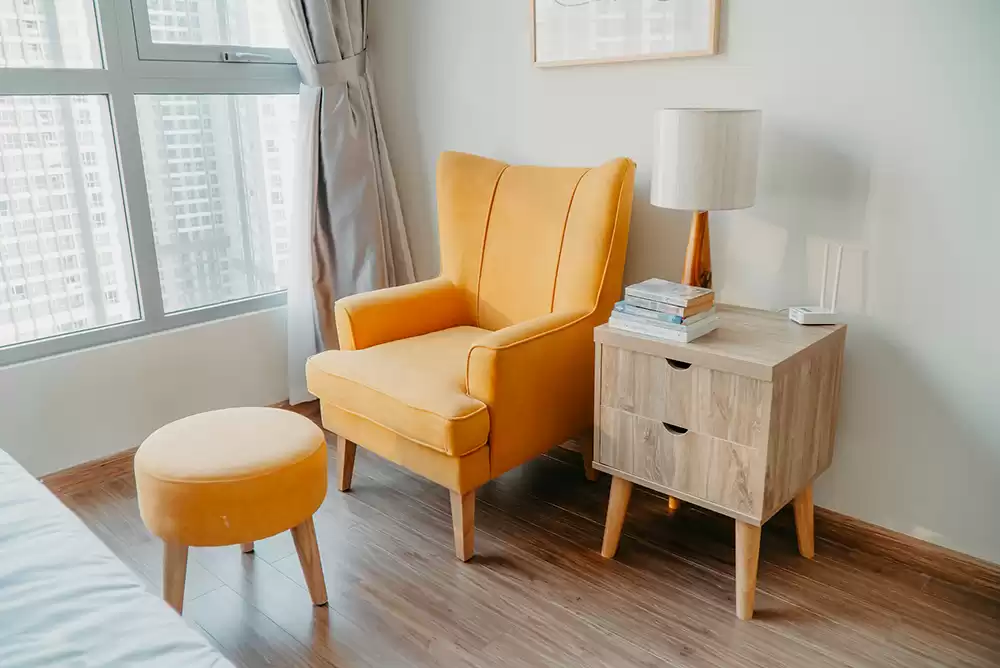By Cory Nye
In today’s world, sustainability is not just a buzzword but a way of life. As a furniture industry veteran, I have seen firsthand how embracing a circular economy can revolutionize how we furnish our homes while reducing our environmental impact.
In this article, we delve into the sustainable practices of furniture rental, exploring how our model minimizes landfill waste and contributes to the preservation of natural resources. By choosing rental over ownership, consumers become active participants in the recycling loop, embodying the essence of sustainability with every piece of furniture they rent.
Sustainable Practices in Furniture Rental
I often explain our approach to sustainability like this: Furniture rental epitomizes sustainability. We acquire furniture, rent it out, maintain it, refurbish it, and rent it out again. We aim for six to seven cycles with each piece.
When furniture ends its rental life, we sell most of it to supportive or transitional housing organizations. These nonprofits assist individuals transitioning out of homelessness, addiction, or incarceration, providing them with furnishings for their “forever homes.”
Compared to purchasing furniture outright, our rental model significantly reduces landfill waste compared to disposable products from companies like Ikea.
Another aspect of sustainability to consider is that refurbishing furniture also reduces the need for new raw materials. Furniture Rental contributes to less deforestation since we use less wood per piece of furniture compared to other methods.
Moreover, packaging waste is significantly reduced—less cardboard, plastic, and other materials associated with new products.
Considering that much of the world’s furniture is manufactured in Asia, there is a significant reduction in diesel fuel consumption for tanker transportation. By sourcing materials locally and avoiding international shipping, we mitigate the environmental footprint associated with long-distance transportation.
Consumer Contribution to Sustainability
Renting furniture embodies sustainability at its core. When comparing renting to purchasing, you are choosing consumerism’s recycling path. While buying involves consuming raw materials and finished goods, renting aligns with the recycling aspect of acquiring goods and services.
In our experience, many of our clients are individuals in transition, such as students, military personnel, retirees, or relocating professionals. For instance, Nike relocated numerous employees from Amsterdam to our area. Instead of bringing their furniture along, they opted to buy or rent it for their temporary stay. Unfortunately, many chose products from companies like IKEA, which often feature a Camlock style of assembly. Once these items are moved or used repeatedly, the Camlocks tend to malfunction, rendering the furniture unusable and destined for the landfill.
In contrast, our rental model encourages a continuous cycle of rent, repair, repart, and repeat. Clients become part of this sustainable loop, avoiding the disposable mindset associated with purchasing and disposing of furniture after short-term use.
The Future is Furniture Rental
With the increasing concern about climate change and the growing emphasis on sustainability among younger demographics, it is becoming a crucial aspect of our business that we need to market more effectively. Historically, we have tended to react to trends rather than proactively shape them.
Moving forward, we need to emphasize the idea of renting, repeating, and participating in furniture recycling instead of the traditional buy-and-throw-away mentality. We must improve our marketing efforts to promote this concept as an industry. There is already a demand for sustainable options, which will only increase as awareness grows.
However, there is a stigma attached to rental furniture, particularly in the “rent-to-own” segment associated with companies like Aaron’s. To overcome this stigma, we need to differentiate ourselves and educate consumers about the benefits of renting furniture as a viable option for short-term needs and long-term lifestyle choices.
Especially with the changes brought about by COVID, where people are increasingly mobile and seeking new experiences in different locations, rental furniture offers a flexible and sustainable solution. We need to shift the narrative from “buying to own” to “renting for life,” highlighting our approach’s practicality and environmental benefits.
Conclusion
Furniture rental’s environmental benefits extend beyond mere convenience; they represent a fundamental shift towards a more sustainable future. By renting furniture, consumers contribute to a circular economy by prioritizing resource conservation and waste reduction. As we look ahead, we must continue to educate and advocate for adopting rental models, emphasizing their long-term environmental and economic advantages. By embracing the mantra of “rent, repair, repart, and repeat,” we not only furnish our homes but also safeguard the planet for future generations. Together, let’s pave the way towards a greener, more sustainable approach to home furnishing.
Author Bio
Cory Nye has over forty years of experience in the furniture industry. Having worked in every aspect of the furniture business, from warehouse to management, both in residential and office furniture, Cory has a comprehensive understanding of the ins and outs of furniture and furniture rental.














